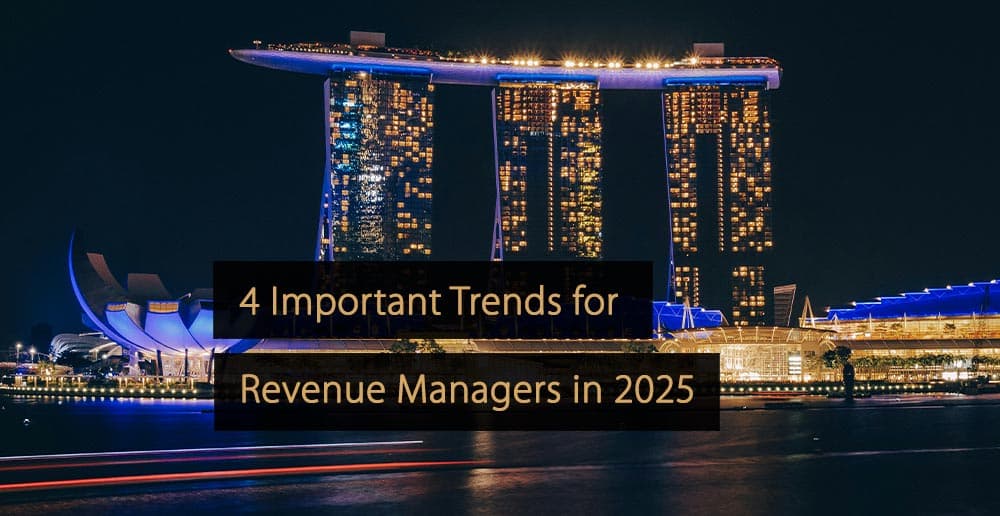The global pandemic has sped up a trend in revenue operations (RevOps) throughout the business world. Forrester recently published a study that found that many companies are moving towards more centralized RevOps. They’ve understood that revenue is more than an outcome and instead of a result of a business process where commercial teams come together to achieve their goals.
Comprehensive RM Standards are Essential for Both Short & Long-Term Success
The Forrester study clarifies that updating an organization’s structure isn’t the only reason this approach is successful. Optimized operations together with comprehensive revenue management standards are key elements for both short- and long-term success. These standards should cover everything from revenue planning, processes and technology to data and measurement.
For nearly ten years, the idea of breaking up silos within commercial hotel teams has been an important discussion topic. However, progress is slow, and many properties still work with largely isolated departments. In many cases, department-specific tools, like revenue management systems (RMS), exacerbate the situation by serving only one team and excluding others. It has become apparent that deep integration and automation of a hotel’s tech stack are needed for centralized RevOps. This has led today’s top SaaS providers to revisit their technology and promote organizational alignment.
Hotels have a unique opportunity to shelve their classical structures in the pandemic’s wake. Instead, lean, centralized commercial teams can take charge and ensure success through automated processes, integrated technology and cross-departmental accountability.
Revenue, Intuition and Hard Work
Until today, strategy and collaboration took a back seat to intuition, experience in the market, and effort to drive hotel revenue. Poorly coordinated campaigns initiated separately by revenue management, marketing, general management or sales led to many lost opportunities and investment, revenue dilution and internal friction. Even though there are plenty of opportunities for growth, data and communication silos in the industry have made meaningful change difficult.
Going on a Detour with Technology
Seeing technology as the answer to all problems is a standard error. However, it’s undeniable that hotel revenue management has come a very long way in recent years. Today’s solutions are more advanced than most experts would have dared to predict. They allow properties to keep up with fast-paced markets and identify new opportunities to generate more revenue. However, the RMSs that makes this possible was explicitly created for revenue management, a highly specialized single department. This has resulted in complex systems that make extensive onboarding and continued interaction necessary.
An experienced revenue manager can take full advantage of everything these modern tools offer. But, unfortunately, technology can also cause operational challenges. For example, marketing, sales and the GM don’t have time to familiarize themselves with complicated RMSs since they have their tools. Revenue managers are in the same situation when it comes to working with tech meant for other departments. Put briefly, the more solutions a hotel uses, the more siloed the operation will become.
Today’s Revenue Tools: Doing More With Less
During and after the pandemic, hotels began taking new approaches towards operations. They began looking for ways to lighten their staff’s workload, make processes more efficient, achieve more with smaller teams and bring commercial teams closer together.
Consequently, commercial teams started changing. For example, hotels are actively breaking up silos and are promoting collaboration instead of rivalry among revenue management, sales and marketing. To achieve the best results, these new commercial teams will use a stack of integrated tools to work together across disciplines. For revenue managers, this will mean automating time-intensive tasks like demand forecasting and rate optimization. They’ll also present results and data in a way the entire commercial team can read and understand.
The idea of achieving better results if you don’t manually analyze every rate update may seem to go against everything you know if you’re used to a legacy RMS. But by now, many innovative hoteliers have learned that leveraging an automated system for pressing tasks like rate optimization gives them a competitive edge.
Free Use-Case: How Wayfarer Hotel Group Outperformed Their Market by 15%
Thanks to Wayfarer’s innovative tech stack, which includes the Atomize RMS, Wayfarer is already making the most of returning demand. Click here to download the Use-Case "How Wayfarer Hotel Group Outperformed Their Market by 15%".
As travel is slowly starting up again, competition among hotels will be intense. However, cutting-edge ideas and innovative approaches will allow hotels to distinguish themselves and get on a path toward sustainable success. Having a deeply integrated tech stack, leveraging automation and promoting internal communication will be your first move towards this goal.
More Tips to Grow Your Business
Revfine.com is the leading knowledge platform for the hospitality and travel industry. Professionals use our insights, strategies, and actionable tips to get inspired, optimize revenue, innovate processes, and improve customer experience.Explore expert advice on management, marketing, revenue management, operations, software, and technology in our dedicated Hotel, Hospitality, and Travel & Tourism categories.








Leave A Comment